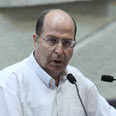
International nuclear talks with Iran have achieved nothing, a senior Israeli official said on Tuesday, suggesting that some Western nations were happy to see the negotiations drag on.
Israel, which has threatened to go to war to prevent its arch-foe going nuclear, has fretted on the sidelines as six world powers press for a curb on Iranian uranium enrichment.
Related stories:
- 'US won't allow Iran to develop nuke'
- 'Iran nuclear talks plagued by mistrust'
- 'Flame virus aims to gather intelligence'
Breaking Israel's official silence on the second round of talks, held in Baghdad last week, Vice Prime Minister Moshe Ya'alon said they had only produced "more Iranian time-buying."
"(There was) no significant achievement except for the Iranians having been given another three weeks or so to pursue the nuclear project until the next meeting in Moscow," he told Army Radio in an interview.
"To my regret, I don't see any sense of urgency, and perhaps it is even in the interest of some players in the West to stretch out the time, which would certainly square with the Iranian interest."

The Baghdad talks on Iran's nuclear program. (Photo: Reuters)
Ya'alon, a member of Prime Minister Benjamin Netanyahu's Likud party, would not elaborate. In January, he accused US President Barack Obama of diluting anti-Iran sanctions for fear of a spike in fuel prices that would sap his bid to win another White House term in November.
Like Israel, Washington says armed force could be a last option against the Iranians, who deny seeking the bomb and have vowed to fight back on several fronts if attacked.
Loath to see a new war in the Muslim world, the Obama administration has sought to reassure the Netanyahu government that discussions have not yet been exhausted.
"Netanyahu's concern that time is running out is justified," a senior US official told reporters in Israel on Friday.
"We are doubtful about whether it is possible to reach an agreement with Iran, but we have to keep trying the diplomatic path because the alternatives, if it's a nuclear Iran or regional war, are very serious."

EU Foreign Policy Chief Catherine Ashton and Iranian negotiator Saeed Jalili (EPA)
The Baghdad meeting focused on foreign efforts to roll back Iran's enrichment of uranium to 20 percent fissile purity, a level approaching bomb grade. Israel wants an immediate curb on lower-level Iranian enrichment as well.
"Even when faced with lesser demands, the Iranians have yet to respond positively," Ya'alon said. Sanctions should be toughened, he said, but "we have not even reached that stage in the talks. Instead, we roll the matter from meeting to meeting."
Asked if the June 18-19 Moscow talks might prove conclusive, Ya'alon said: "Let's hope. ...The Iranians are working to buy time, to hoodwink the Western world and to continue spinning (uranium) centrifuges toward a military capability."
Though Israel is reputed to have the region's only atomic arsenal, many international experts, including the top US military officer, General Martin Dempsey, have voiced doubt in the ability of its conventional forces to deliver lasting damage to Iran's dispersed and well-defended nuclear facilities.
That has given rise to speculation that Israel is involved in a recent rash of anti-Iran sabotage, including cyber-warfare.
A new computer virus, dubbed Flame, emerged on Monday, with analysts saying it may have been built on behalf of the same nation that commissioned the unclaimed Stuxnet worm that struck Iran's nuclear programme in 2010.
"I reckon it is certainly reasonable that everyone who sees in the Iranian threat a significant threat - and that is not just Israel, but all of the Western world, led by the United States - is resorting to all means available, including these, in order to harm the Iranian nuclear project," he said.















